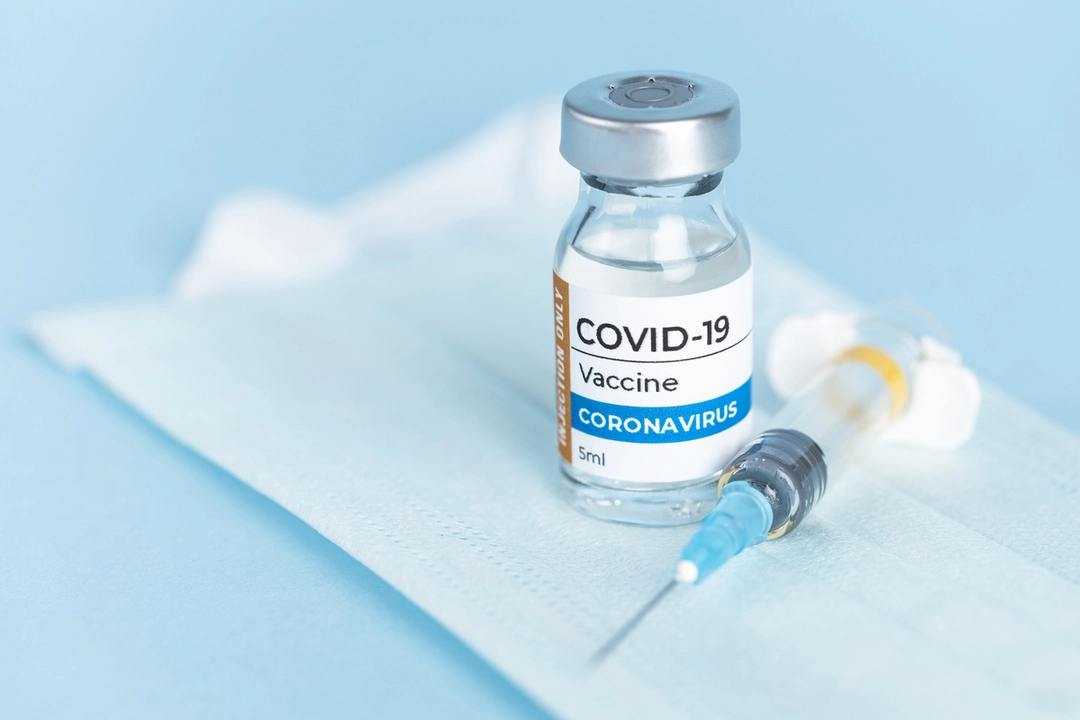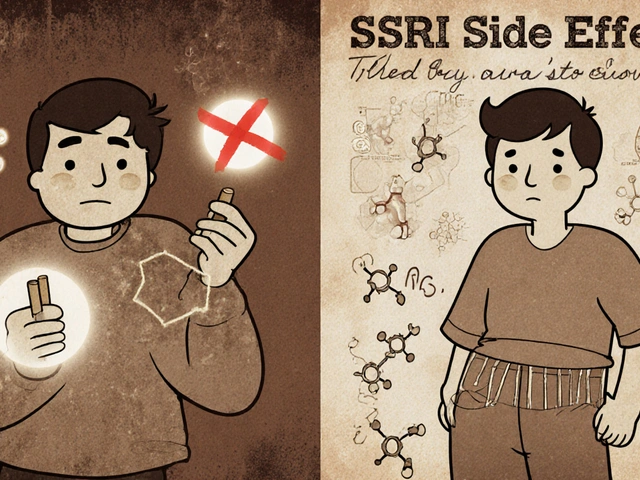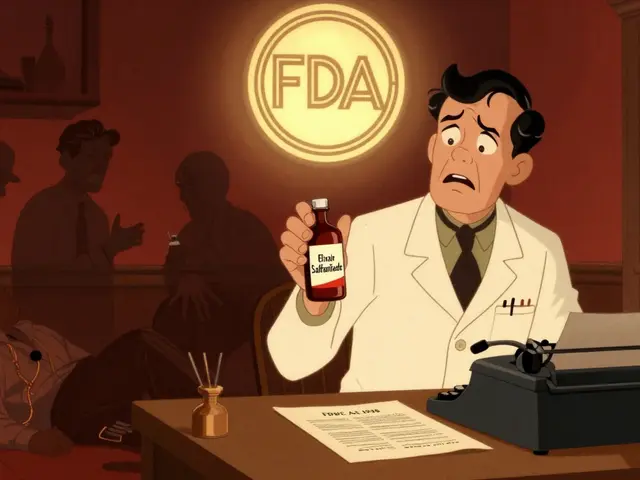Aluminium hydroxide in vaccines: understanding its purpose and safety
Introduction to Aluminium Hydroxide in Vaccines
As a concerned individual, I often find myself questioning the various components of vaccines and their purpose. One such component that has caught my attention is aluminium hydroxide. In this article, I will be discussing the purpose and safety of aluminium hydroxide in vaccines, and why it is an essential ingredient. My aim is to provide you with a comprehensive understanding, so you can make informed decisions about vaccinations for yourself and your loved ones.
The Role of Aluminium Hydroxide in Vaccines
Aluminium hydroxide is a chemical compound that is widely used as an adjuvant in vaccines. Adjuvants are substances added to vaccines to enhance the body's immune response to the vaccine, thus providing better protection against the disease. The use of aluminium hydroxide as an adjuvant dates back to the 1920s, and it has since been incorporated in numerous vaccines, such as those for hepatitis A, hepatitis B, and diphtheria-tetanus-pertussis (DTP).
Aluminium hydroxide works by stimulating the immune system to produce a stronger and more prolonged response to the vaccine. It also helps to maintain the vaccine's stability and prolong its shelf life. In addition, aluminium hydroxide can improve the vaccine's effectiveness by slowing down the release of the antigen, which is the substance that triggers the immune response. This ensures that the immune system has enough time to recognize and respond to the antigen properly.
Understanding the Safety of Aluminium Hydroxide
Many people express concerns about the safety of aluminium hydroxide in vaccines. However, it is important to understand that the amount of aluminium hydroxide used in vaccines is minimal and safe for human use. In fact, the levels of aluminium found in vaccines are significantly lower than those found in everyday items such as antacids, food, and drinking water. The World Health Organization (WHO) and the Centers for Disease Control and Prevention (CDC) have both deemed the use of aluminium adjuvants in vaccines to be safe.
It is also crucial to note that the aluminium used in vaccines is not the same as the metallic aluminium found in cookware and other products. The aluminium hydroxide used in vaccines is a salt, which has different properties and a lower toxicity compared to metallic aluminium. Furthermore, the human body is efficient at processing and eliminating aluminium, and the kidneys play a significant role in this process.
Addressing Common Concerns
One of the most common concerns about aluminium hydroxide in vaccines is the potential link to neurological disorders, such as autism. Numerous studies have been conducted to investigate this claim, and the overwhelming consensus among the scientific community is that there is no evidence to support a connection between aluminium adjuvants and autism or other neurological disorders. The Institute of Medicine, the WHO, and the CDC all support this conclusion.
Another concern is the possibility of an allergic reaction to aluminium hydroxide. Although rare, some individuals may develop an allergy to aluminium. In such cases, it is essential to discuss this with your healthcare provider, who can recommend alternative vaccination options if necessary.
Benefits of Aluminium Hydroxide in Vaccines
The advantages of using aluminium hydroxide as an adjuvant in vaccines far outweigh the risks. The primary benefit is the improved effectiveness of the vaccine. By stimulating a stronger immune response, aluminium hydroxide ensures that the vaccine provides better protection against the targeted disease. This ultimately leads to a reduction in morbidity and mortality rates associated with vaccine-preventable diseases.
Another benefit of aluminium hydroxide in vaccines is its cost-effectiveness. The use of adjuvants allows for a lower amount of antigen to be used in the vaccine, which ultimately reduces the overall cost of vaccine production. This is particularly important for developing countries, where resources for vaccination programs may be limited.
Regulation and Monitoring of Aluminium Hydroxide in Vaccines
Ensuring the safety and efficacy of vaccines is of utmost importance. Regulatory agencies, such as the Food and Drug Administration (FDA) in the United States, closely monitor the production and use of vaccines containing aluminium hydroxide. These agencies enforce strict guidelines and quality control measures to ensure that the vaccines are safe and effective.
Furthermore, ongoing research is conducted to continually assess the safety and efficacy of aluminium hydroxide in vaccines. This research helps to identify any potential issues and further refine the use of adjuvants in vaccines. It is through this rigorous process that we can trust the safety of vaccines and their ability to protect us from dangerous diseases.
Conclusion: Aluminium Hydroxide in Vaccines is Safe and Beneficial
In conclusion, aluminium hydroxide is a well-established and safe adjuvant used in vaccines to boost the immune response and improve vaccine effectiveness. The safety of aluminium hydroxide in vaccines is supported by numerous studies, regulatory agencies, and the scientific community. While it is natural to have concerns about vaccine components, understanding the purpose and safety of aluminium hydroxide in vaccines can help to ease these concerns and build trust in the vaccination process.







8 Comments
Jonathan Lindsey
April 30, 2023 at 04:00
Ah, the illustrious aluminium hydroxide, that darling of immunology, which has been gallantly escorting vaccines since the roaring twenties. One cannot help but marvel at how this unassuming compound quietly nudges our immune system into a more enthusiastic greeting, much like a polite yet insistent maître d' at a fine restaurant. Its adjuvant prowess lies in the gentle prolongation of antigen release, allowing our bodies to savor the exposure rather than gulp it down in a rushed fashion. Indeed, the very chemistry of aluminium hydroxide subtly forms a depot effect, a term that sounds like something out of a spy novel, but in reality simply means it lingers just enough to keep the immune troops on alert.
Furthermore, the safety dossier on this ingredient reads like a symphony of reassurance: the quantities employed are infinitesimally small, dwarfed by the aluminium we ingest daily via food and water. To put it in perspective, a single vaccine dose contains less aluminium than a typical antacid tablet, a fact that should soothe any lingering doubts. Regulatory bodies such as the WHO and CDC have meticulously examined the data, emerging with a unanimous verdict of safety-a verdict that, admittedly, carries the weight of decades of research.
Critics occasionally raise the specter of neurotoxicity, yet the corpus of peer‑reviewed studies consistently finds no causal link between aluminium adjuvants and autism or other neurological disorders. The immune system, ever the diligent steward, efficiently processes and excretes the aluminium, primarily via the kidneys, leaving no lingering residue to wreak havoc.
Beyond safety, the economic ramifications are equally compelling. By enhancing immunogenicity, aluminium hydroxide permits lower antigen doses, thereby reducing manufacturing costs-a boon for low‑resource settings where vaccine access is paramount. In sum, this humble compound performs a balancing act of efficacy, safety, and affordability, and for that reason it remains an indispensable ally in the fight against preventable diseases.
Gary Giang
April 30, 2023 at 05:00
Honestly, the way aluminium hydroxide works is like adding a splash of spice to a dish you already love. It doesn’t change the flavor of the vaccine, it just makes the immune system notice it more, kind of like a subtle drum roll before a big reveal. The science behind the depot effect is fascinating, yet the everyday analogy keeps it grounded. In short, it’s a clever trick that’s been proven safe for generations.
steve wowiling
April 30, 2023 at 06:46
Vaccines with aluminium are just fine.
Warren Workman
April 30, 2023 at 07:46
While many tout the benefits, it’s worth noting that the jargon surrounding "adjuvant" can sometimes obfuscate rather than illuminate. In the biotech lexicon, terms like "immunopotentiation" and "antigen depot" are tossed around to sound impressive, yet the core principle remains straightforward: it’s a catalyst for a stronger immune response. That said, the industry does love its buzzwords, and a healthy dose of skepticism never hurts when navigating such technical terrain.
Kate Babasa
April 30, 2023 at 09:33
Let’s take a moment, shall we, to appreciate the breadth of data supporting aluminium hydroxide’s safety!; The epidemiological studies spanning multiple continents,; the WHO’s rigorous review processes,; and the CDC’s continual post‑marketing surveillance all converge on a single, reassuring conclusion: this adjuvant is safe when used as intended. Moreover, the biochemical distinction between aluminium salts used in vaccines and metallic aluminium found in cookware is crucial-one is a bio‑compatible compound, the other a raw metal.
king singh
April 30, 2023 at 10:33
I agree with the comprehensive safety overview. It’s important we keep the conversation factual and collaborative.
Adam Martin
April 30, 2023 at 11:33
Sure, the data looks solid, but let’s not forget that a little sarcasm can keep us on our toes; after all, complacency is the real enemy of science. While I’m all for the consensus, I’m also the type who asks, “What if there’s a nuance we missed?” That’s not denial-it’s curiosity, wrapped in a witty remark. So, kudos to the researchers, and kudos to the skeptics who keep the dialogue lively.
Ryan Torres
April 30, 2023 at 12:33
🚨 Look, the “official” story sounds neat, but have you considered the hidden supply chains? 💊 Some whisper that aluminium could be a gateway for other undisclosed additives. 🤔 The fact that regulators always say "safe" makes me wonder if there’s a larger agenda at play. 🌐 Stay vigilant, question everything, and don’t take the press release at face value. 🛑